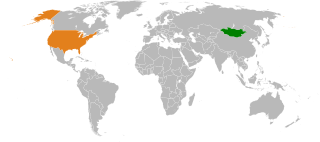United States intervention in Chilean politics started during the War of Chilean Independence (1812–1826). The influence of United States in both the economic and the political arenas of Chile has since gradually increased over the last two centuries, and continues to be significant.
Robert Charles Hill was an American diplomat.

Project FUBELT is the codename for the secret Central Intelligence Agency operations that were to prevent Salvador Allende's rise to power before his confirmation and to promote a military coup in Chile. This project came after the circumstantial failure of Track I, which involved making president Eduardo Frei Montalva interfere with the 1970 national election in opposition to Allende.

Argentina and the United States have maintained bilateral relations since the United States formally recognized the United Provinces of the Río de la Plata, the predecessor to Argentina, on January 27, 1823.

Equatorial Guinea – United States relations are bilateral relations between Equatorial Guinea and the United States.

Mongolia–United States relations are bilateral relations between the United States and Mongolia.

Diplomatic relations between Iraq and the United States began when the U.S. first recognized Iraq on January 9, 1930, with the signing of the Anglo-American-Iraqi Convention in London by Charles G. Dawes, U.S. Ambassador to the United Kingdom. The historiography of Iraq—United States relations prior to the 1980s is considered relatively underdeveloped, with the first in-depth academic studies being published in the 2010s. Today, the United States and Iraq both consider themselves as strategic partners, given the American political and military involvement after the invasion of Iraq and their mutual, deep-rooted relationship that followed. The United States provides the Iraqi security forces hundreds of millions of dollars of military aid and training annually as well as uses its military bases.

Joseph Palmer II was an American diplomat and State Department official whose career focused on U.S. relations with Africa.

The Embassy of the United States to Bahrain is the diplomatic mission of the United States in Bahrain. The building is located in Zinj, a district of the capital, Manama. The post of U.S. Ambassador to Bahrain is currently held by Steven C. Bondy.

The Embassy of the United States in El Salvador is located in Antiguo Cuscatlán. The Ambassador of the United States to El Salvador is William H. Duncan from since 2023.

The United States Embassy in Poland is situated on Ujazdów Avenue in Warsaw, Poland. The United States also maintains a consulate in Kraków.
The mission of the United States Embassy in Nicaragua is to advance the interests of the United States, and to serve and protect US citizens in Nicaragua. As of 2023, Chargé d’Affaires of the United States to Nicaragua is Kevin O'Reilly.

Relations between Czechoslovakia and the United States refer to two periods in Czechoslovakia's history. The first being the establishment of Czechoslovakia after its declaration of independence in 1918 from Austria-Hungary initiated by President Woodrow Wilson as part of his Fourteen Points following World War I. The second period being the communist era from 1948 when relations were strained, until 1992 when Czechoslovakia split forming the independent nations of the Czech Republic and Slovakia as a result of the 1989 Velvet Revolution.
The Embassy of the United States in Asunción is the diplomatic mission of the United States in Paraguay.












